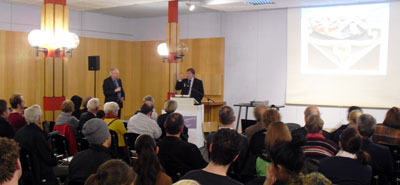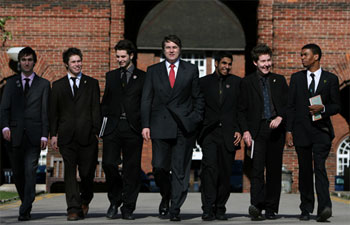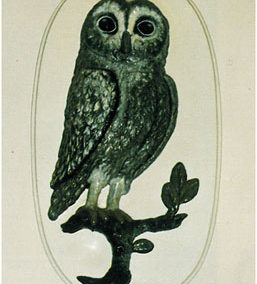In einer gemeinsamen Veranstaltung des Nikolaus-Groß-Abendgymnasiums und der Deutsch-Englischen Gesellschaft Ruhr e.V. sprach am Abend des 28. November der Highmaster der Manchester School, Dr. Christopher Ray über seine Schule und ihre Verbindungen zu Deutschland. Die MGS wurde im Jahre 1515 durch Hugh Oldham, den Bischof von Exeter gegründet und so wird sie im Jahre 2015 ihr 500jähriges Jubiläum. Das Motto dieser Schule ist „Sapere aude“ und die Schüler tragen ein Bild der Eule als Zeichen der Weisheit auf ihrer Schuluniform.
-

In der Aula des Nikolaus Groß Abendgymnasiums: Bernhard Nadorf (links stehend) und Dr. Christopher Ray (am Rednerpult)
-

Dr. Christopher Ray (im Bild in der Mitte)
-

Die Eule, die Schüler auf ihrer Schuluniform tragen
-

Die Manchaster School zu Beginn des 20. Jahrhunderts und heute
-

Zusammentreffen mit den Gästen des Abends...
-

... im Anschluss an den Vortrag.
Mit 1600 Schülern ist die MGS die größte Jungenschule im Vereinigten Königreich und ist bei den landesweiten rankings ihrer A-Level Ergebnisse immer unter den besten. Durch die systematische finanzielle Förderung von Kindern aus sozial schwachen Familien schafft die Schule die Voraussetzungen, dass alle Jungen, die es schaffen, die Eingangsüberprüfungen erfolgreich zu absolvieren, die Schule auch zu besuchen. Die Lehrpläne der Schule zielen nicht nur darauf ab, die intellektuellen Fähigkeiten der Schüler zu fördern und optimal auf die zentralen Leistungsüberprüfungen vorzubereiten. Darüber hinaus bietet die Schule eine Fülle von insgesamt 132 Arbeitsgemeinschaften an (sog. Extracurricular activities), die zu einer umfassenden Persönlichkeitsentwicklung beitragen. Als die MGS im Jahre 1515 gegründet wurde, wurde sie von 40 Jungen besucht, und die Fächer waren Latein, Griechisch und Religion. Mathematik war optional. In der Zeit der Industriellen Revolution, die von der Stadt Manchester ausging, veränderte sich auch der Fächerkanon, sodass fortan auch die mathematisch-naturwissenschaftlichen Fächer in den Lehrplan aufgenommen wurden.
Die Beziehungen zu Deutschland und zu Deutschen Schulen haben für die Lehrenden und Schüler der Manchester Grammar School im Rahmen ihrer vielfältigen internationalen Kontakte immer eine besondere Rolle gespielt. So erinnerte Dr. Ray daran, dass der Highmaster der Schule trotz der Proteste von Eltern nach dem Zweiten Weltkrieg an einer Klassenfahrt in das zerstörte Deutschland festgehalten und dabei betont habe, dass es für ihn keine Kollektivschuld aller Deutschen gebe. Dieser Einsatz für die Versöhnung zwischen ehemals verfeindeten Nationen findet auch seinen Ausdruck auf der Tafel der „Assembly Hall“ in der Manchester Grammar School. Dort ist – inmitten vieler englischer Namen von gefallenen Soldaten – auch der Name eines Deutschen Lehrers verzeichnet, der in der Zeit von 1912 bis 1913 an der MGS tätig war, dann in seine Heimat zurückkehrte und dann auf dem Schlachtfeld von Flandern im Kampf gegen England fiel. Damit verbindet sich die Geschichte der MGS mit der Geschichte vieler anderer Schulen und auch mit der Geschichte der Deutsch-Englischen Gesellschaft Ruhr e.V., die nach dem Zweiten Weltkrieg gegründet wurde, um in den Ruinen des Zweiten Weltkriegs die Grundlagen für Frieden und dauerhafte Versöhnung zu legen.
Intro von Schulleiter Bernhard Nadorf
The address of the Headmaster of the Nikolaus-Groß-Abendgymnasium and Chairman of the „Deutsch-Englische Gesellschaft Ruhr e.V.“ Bernhard Nadorf on the occasion of the visit of the High Master of the Manchester Grammar School, Dr. Christopher Ray
Dear members of the Deutsch-Englische- Gesellschaft, Dear Guests and last but not least dear teachers and students of our Nikolaus-Groß-Abendgymnasium
It was in the brilliant Indian summer of 1972 when I travelled with my VW beetle and all the belongings of a German student at the age of 22 from the city of Heidelberg to Manchester to take up a teaching post at the Manchester Grammar School.
Those were the days of pre-Internet and pre-Ryanair when communication was by snailmail or airmail, not email and when it took three and a half hours to cross the channel from Oostende to Dover – on an air mattress in the bar of a fairly dilapidated steamer.
One of the pioneers of this time, Anthony Allport is today with us – he belongs to one of the rare cases where an English assistant teacher or should I say a Welsh assistant teacher became a school director in Germany.
Little did I know on my arrival in Kent on a foggy day at 2 o`clock in the morning about my new school and its position within the national and international school system. It was my unforgettable Landlady Mrs. Luisa Farrington, who first informed me that the Manchester Grammar School was an exceptional place offering the highest academic standards and an extraordinary range of extracurricular activities to all of its boys. Since the day when I said good-bye to this school at a garden party with the then High Master Peter Mason in the summer of 1973 it has always been my dream to invite the High Master of this school to Germany. Tonight this dream has become true and so I am delighted to welcome Dr. Christopher Ray, one of his successors here tonight.
Welcome Dr. Ray to Germany, to the Ruhr area and to Essen and thank you so much for accepting our invitation.
Dr. Christopher Ray has been the High Master of the Manchester Grammar School since 2004. Before teaching Physics and Philosophy in schools Dr Ray taught Philosophy at universities in Oxford, Singapore and the USA. He is the author of two books and a number of articles on the Philosophies of Science and of Space and Time. He has written and lectured extensively on educational issues and has been consulted by senior UK ministers and by the Prime Minister David Cameron.
He is currently Chairman-elect of the Headmasters‘ and Headmistresses‘ Conference, which represents 250 leading independent schools in the UK, Europe and the rest of the world.
Ladies and gentlemen, dear students: In the year 2015 the Manchester Grammar School will be celebrating the 500th anniversary of its foundation and tonight I am equally delighted to welcome Sister Ulrike Michalski from the BMV school here in Essen, a school with 1500 girls and a history stretching back over more than 350 years. Welcome sister Ulrike.
Ladies and gentlemen, Dear students: The history of the Manchester Grammar school is closely connected with the development of a city that the British Prime Minister Benjamin Disraeli once characterized with the following sentence: “What Manchester does today, the world does tomorrow”. The Age of Humanism, The Age of Enlightenment and above all the Industrial Revolution, when visitors from the continent called Manchester “The shock city of the age” – all these stages of the historical journey through time have been central both to the history of the city of Manchester and to the development of the School which proudly bears its name.
Founded at the beginning of the 16th century by Hugh Oldham, a friend of Erasmus of Rotterdam, when Henry VIII was King of England and Maximilian I ruled the Holy Roman Empire of the German nation it adopted the motto “Sapere aude”, “Dare to be wise”, “Wage es, weise zu sein” in the Age of Enlightenment, when Immanuel Kant proclaimed the “Aufbruch aus der selbstverschuldeten Unmündigkeit”, “Man’s emergence from his self-imposed immaturity”.
It has always been the policy of this school and its High Masters to offer every boy who qualifies a chance to participate in an exciting educational concept of enlightenment– with motivated teachers and ambitious boys – and consequently outstanding academic standards and results in the nationwide rankings.
This is the key Number one aim set out in the Strategic Plan of the Manchester Grammar school and I quote:
„Demonstrate continuing commitment to the widest possible access so that any boy who is awarded a place at the School will be able to take up his place regardless of the social, cultural, ethnic, religious or financial background of his family, thereby providing additional charitable public benefit.“ unquote
Academic and personal excellence and achievement are not confined to those who are born rich or as we say with a silver spoon in their mouth – this is the common message of the Manchester Grammar school, of the BMV School and of the Nikolaus-Groß-Abendgymnasium.
Our patron Nikolaus Groß started as a miner in a small place in the Ruhr area. He took part in evening courses and was to become a leader of the working class movement at the Ruhr, a resistance fighter and a Saint of the Catholic Church. Our students work eight hours a day and take their A-Levels in their free time with the same and even better results than those who attend day schools.
All those who try to follow their dreams with energy, determination and resilience at whatever age in their lives belong to the elite in our countries – irrespective of the money that their parents can invest – in Essen or in Manchester or worldwide – and especially so our students from migrant families.
And after watching nationwide Television yesterday night, when Mrs Heide Steppke, who took her examinations at the age of 71 last summer was interviewed by Günther Jauch, I might add that there are no age limits.
We need to encourage all boys and girls and all men and women who strive to realize their individual potential – in the footsteps of persons who came from a humble family background and who firmly believed that they could reach the top through learning: Yes, we can: An American boy who was born into a poor family in Hawaii in 1961 and who became President, a German boy who grew up in a postwar one parent family, worked as a shop assistant in Göttingen, took his Abitur at an Abendgymnasium and later became German chancellor or a boy who was born in the village of Mvezo in South Africa, attended the Methodist school of Qunu to finish the system of apartheid and to become the President of the Republic of South Africa.
Barack Obama, Gerhard Schröder and Nelson Mandela share one central experience: They were deeply convinced that they could fulfill their personal dreams and ambitions through education and further education and above all through continuous hard effort. They have dared to be wise and they were encouraged by teachers who believed in their potential.
Ladies and gentlemen: The motto Sapere aude is timeless: In the face of the threat of National Socialism in the late 1920s Nikolaus Groß who had become the chief editor of a newspaper wrote:” Der Nationalsozialismus ist das Sammelbecken der politisch Unmündigen und Unreifen”. National Socialism is the political party representing those who are politically not of age and immature.”
He called on his fellow citizens to defend democracy, Christian values and human dignity in this country and the program of Immanuel Kant in the face of a political party which was set on destroying the values of enlightenment.
The enlightenment that takes place in our schools is the best protection against any violation of human rights – through the centuries and worldwide.
Ladies and gentlemen: When I arrived at Manchester Grammar School back in 1973, I was not only impressed with the diversity and the quality of its educational program and the results that our boys achieved, I was touched and humbled by the hospitality and the personal friendship with which I was received in the staffroom – I was even – after some internal consultations about the rights of a foreign teacher – admitted to the wine club, which in those days always offered a glass of sherry in the lunchtime break.
This is a personal experience that many of our members and many of those who have visited the United Kingdom share and cherish. And even in the difficult times of our history the personal relationships and friendships between the people, their families and the cities in both countries have formed an enduring, an indestructible bridge.
Sometimes signs of this enduring affection can be detected even in times of war and military conflict. I have always been touched and impressed by the fact that on the roll of honor in the assembly hall of the Manchester Grammar school which commemorates the teachers and students who were killed in combat in the two Great Wars I found the name of Dr. Bernhard Neuendorff, a German teacher who had returned to Germany before the war and was killed in action in the fields of Flanders.
The month of November, dear students and members of the Deutsch-Englische Gesellschaft is traditionally a month of mourning and commemoration. When we include our former enemies into that commemoration thus respecting the personal sacrifice of every human being, we lay the foundation for a United Europe which is based on understanding and reconciliation. Students and teachers of schools in both countries and organizations such as the Deutsch-Englische Gesellschaft and the great number of relationships between twin cities in the Ruhr area and in North England have made and will continue to make a substantial contribution to this process.
„The Manchester Grammar School and Germany: An Enduring Affection“ or: ”A German school director`s enduring affection with The Manchester Grammar School”.
Dear Christopher, the floor is yours.
